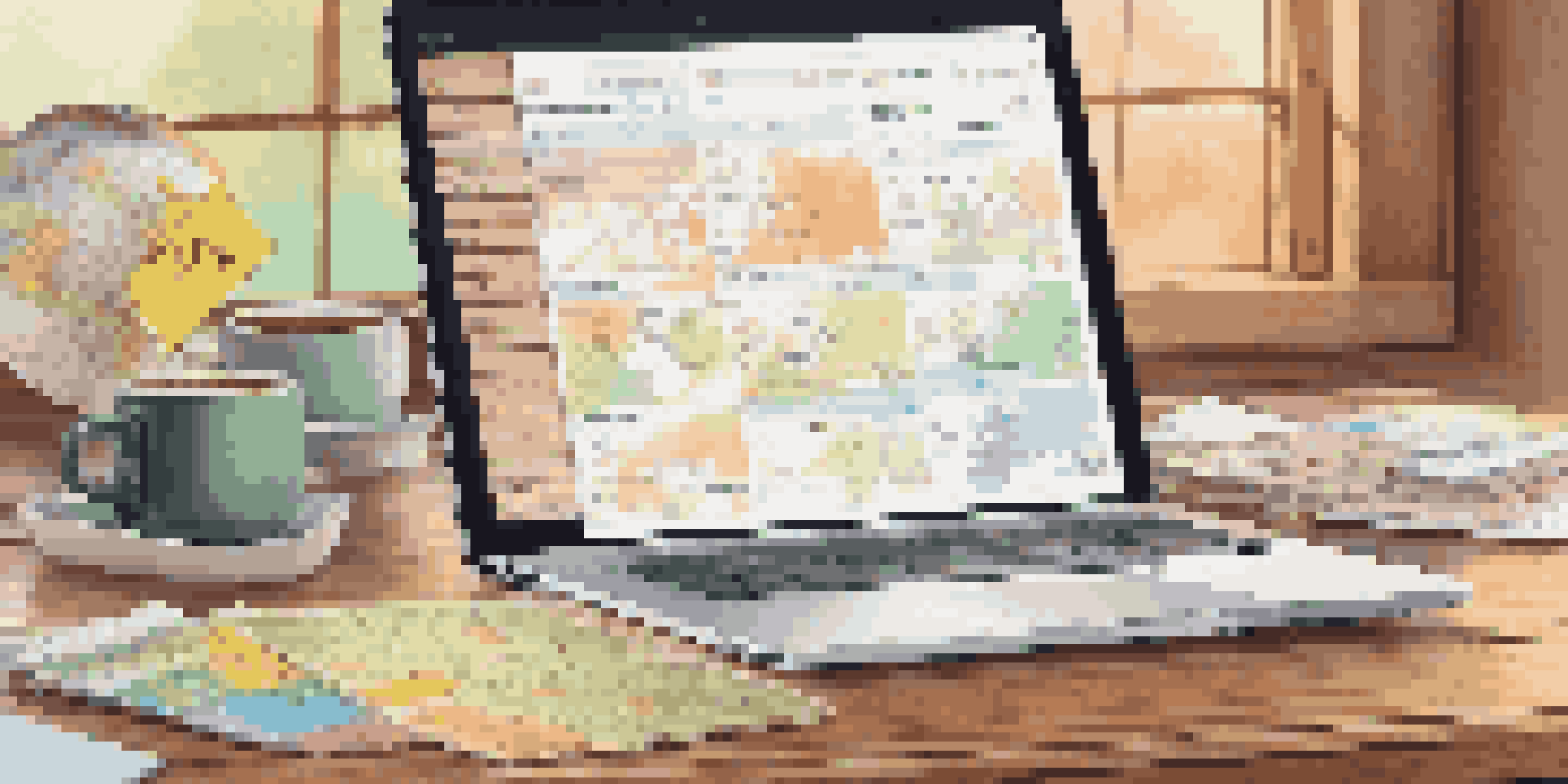Creating a Travel Budget: What to Include and Exclude

Understanding the Importance of a Travel Budget
Creating a travel budget is crucial for ensuring you enjoy your trip without financial stress. It helps you allocate funds wisely, avoiding overspending and the dreaded post-vacation financial hangover. By planning ahead, you can prioritize experiences that matter most to you, whether it’s dining at a fancy restaurant or exploring local attractions.
A budget is telling your money where to go instead of wondering where it went.
Moreover, a well-crafted budget allows you to make informed decisions about where to stay, what to eat, and how to get around. Instead of winging it, you'll have a clear roadmap that aligns with your financial goals. This sense of structure can make your travel experience more enjoyable, as you won't constantly worry about your spending.
Finally, having a budget can also encourage you to seek out creative solutions to save money. You might discover free activities, local eateries, or discounts that enhance your travel experience without breaking the bank.
Key Expenses to Include in Your Travel Budget
When creating your travel budget, start by listing all potential expenses. This typically includes transportation, accommodation, food, activities, and travel insurance. For example, if you're flying to your destination, consider not only the ticket price but also airport transfers and baggage fees.

Accommodation can vary greatly in price, so it’s wise to compare options like hotels, hostels, or vacation rentals. Additionally, don’t forget to budget for daily meals, which can add up quickly, especially if you plan to dine out for every meal. By accounting for these key expenses, you’ll have a clearer picture of your financial needs.
Create a Travel Budget
Establishing a travel budget helps you manage expenses and prioritize experiences, ensuring a stress-free trip.
Lastly, consider setting aside some funds for unexpected costs, such as medical emergencies or last-minute activities. This buffer will give you peace of mind, knowing that you’re prepared for whatever comes your way during your travels.
Identifying Optional Expenses to Exclude
While it's essential to budget for necessary expenses, not all spending is mandatory. Consider excluding optional expenses that don't align with your travel priorities. For instance, if luxury spa treatments or high-end dining aren't a must for you, it’s wise to leave those out of your budget.
It’s not about how much money you make, but how much you keep and how hard it works for you.
Additionally, activities that you can easily skip without affecting your trip can also be excluded. Think about experiences that may seem enticing but aren't essential to your enjoyment, such as expensive guided tours. Instead, opt for self-guided exploration or free local events.
By focusing on what truly matters to you, you can allocate your funds more effectively. This mindful approach allows for a more enriching travel experience while keeping your budget intact.
Utilizing Technology for Budget Tracking
In today’s digital age, tracking your travel budget has never been easier. There are numerous apps available that can help you manage your expenses on the go. These tools allow you to input your spending in real-time, ensuring that you stay on target throughout your trip.
For example, apps like Mint or TravelMapper can help you categorize expenses and provide insights into your spending habits. Additionally, they often offer visual representations of your budget, making it easy to see where your money is going. This immediate feedback can help you adjust your spending as necessary.
Include Key Expenses
Be sure to account for essential costs like transportation, accommodation, and food to have a clear financial picture.
Moreover, some apps allow you to set travel-specific budgets, helping you keep your vacation finances separate from your everyday expenses. This feature is especially handy when you need to keep a close eye on your travel funds.
Planning for Currency Exchange and Fees
When traveling internationally, currency exchange rates and fees can significantly impact your budget. It's essential to research the current exchange rate and any fees associated with converting your money. Some banks and ATMs charge high fees, which can quickly eat into your budget.
Consider using a multi-currency debit card or a travel credit card that offers favorable exchange rates and minimal fees. These options can help you save money while also providing a convenient way to access funds during your travels. Just be sure to notify your bank of your travel plans to avoid any issues.
Additionally, always keep some cash on hand for small purchases or places that don’t accept cards. By planning for these factors, you can avoid unpleasant surprises and stay within your travel budget.
Setting Aside a Contingency Fund for Emergencies
Life is unpredictable, and travel is no exception. Setting aside a contingency fund within your budget can help you prepare for unforeseen circumstances. This fund can cover emergencies like medical needs, lost luggage, or unexpected travel changes, ensuring you're not caught off guard.
A good rule of thumb is to allocate around 10-15% of your total budget for this purpose. For example, if your total travel budget is $2,000, aim to set aside $200-$300 for emergencies. This small investment can provide peace of mind, allowing you to focus on enjoying your trip.
Plan for Emergencies
Setting aside a contingency fund prepares you for unforeseen events, allowing you to handle unexpected challenges with ease.
By having a contingency fund, you can navigate unexpected challenges more smoothly, knowing that you’re financially prepared. This proactive approach can transform potential stress into manageable situations, allowing for a more enjoyable travel experience.
Reviewing and Adjusting Your Budget Before Travel
Once you’ve outlined your travel budget, it's crucial to review and adjust it as needed before you embark on your journey. Take the time to compare your estimated expenses with your actual budget. This step ensures that you're on track and can highlight any areas that may need adjustments.
For instance, if you find that accommodation prices have increased or certain activities you planned are more costly than expected, adjust your budget accordingly. This flexibility can help you avoid overspending and ensure that you still enjoy your trip.

Lastly, don’t hesitate to make last-minute changes to your plans. Sometimes, spontaneous decisions can lead to the most memorable experiences, but it’s important to ensure they fit within your adjusted budget.